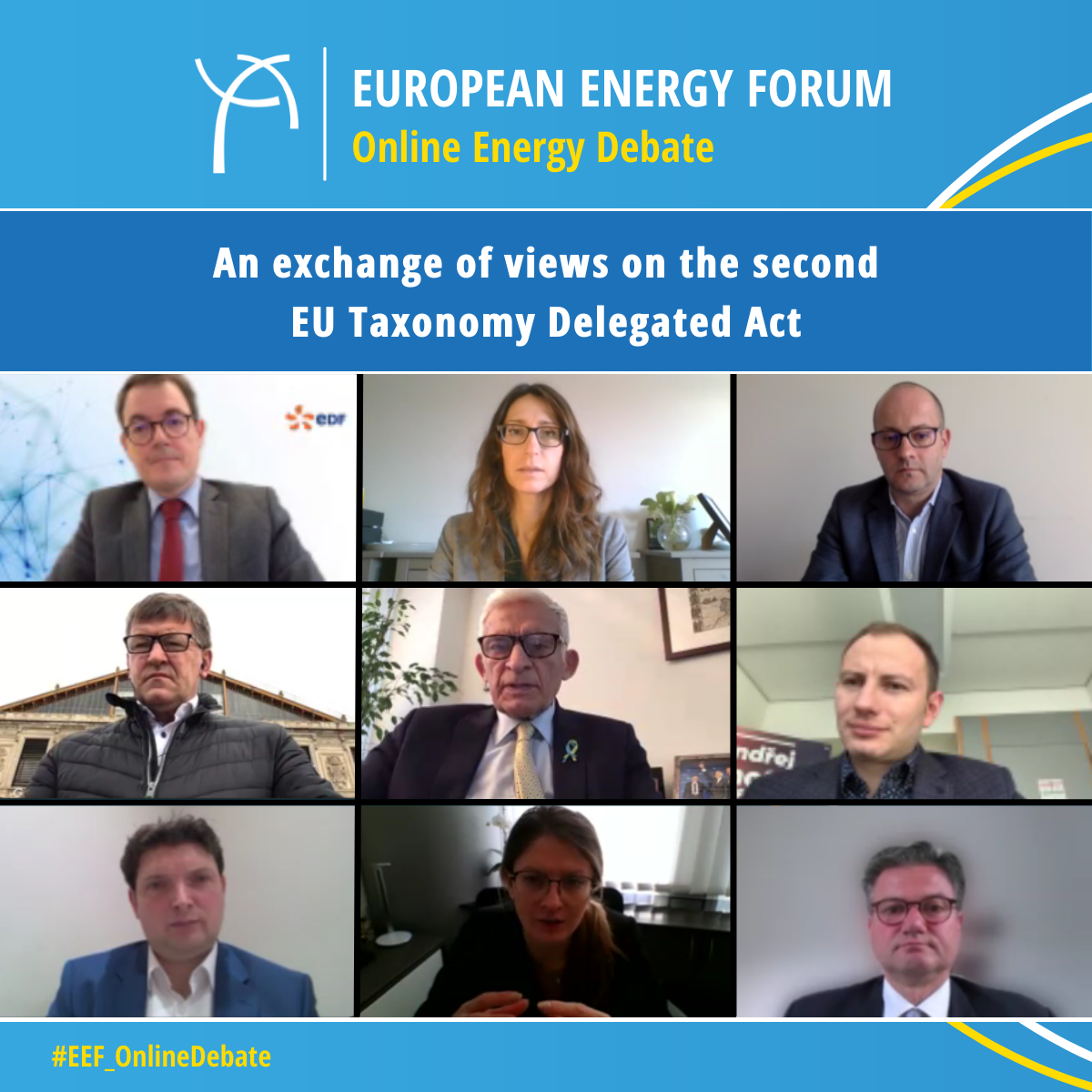An exchange of views on the second EU Taxonomy Delegated Act
Chair:
MEP Jerzy Buzek, President of the EEF
Panel:
Erkki Maillard, Senior Vice President European affairs, EDF
James Watson, Secretary General, Eurogas
Yves Desbazeille, Director General, Foratom
Ondrej Knotek MEP, Director of the EEF
Tsvetelina Penkova MEP, Director of the EEF
Radan Kanev MEP, Active Member of the EEF
Moderator:
Pascale Verheust, Director General of the EEF
The EEF organized an Online Energy Debate on the debated second Taxonomy Delegated Act, which was adopted by the European Commission in February 2022. The panel was composed of speakers from the nuclear and gas sectors and MEPs Members of the EEF. The debate, chaired by EEF President MEP Jerzy Buzek, offered a mid- and long-term look at the Taxonomy.
Erkki Maillard, Senior Vice President European affairs at EDF, explained the Second Delegated Act is a part of the puzzle in which the EU strengthens its energy sovereignty. We need to focus on decarbonisation and security of supply combining renewables, hydro included, with nuclear. It is thus positive that nuclear is seen as one tool to tackle climate issues. He explained that direct electrification of end uses is the most efficient way to decarbonise the economy. Nuclear already plays a role in this regard – 66% of European electricity is already decarbonised and a 50% of that is thanks to nuclear – and will continue doing so as the demand for low-emission electricity is due to increase. That’s why although not perfect, the proposed delegated act is important and should receive the support of the European Parliament.
Yves Desbazeille, Director General of Foratom, underlined that the inclusion of nuclear in the taxonomy is science-based. Nuclear contributes to a more independent Europe and should not be seen as transitional only. He added that the Delegated Act should be supported and mentioned some criteria that should be revised: the so-called “accident-tolerant fuel” as from 2025 – this fuel still being assessed in the EU, and the operability of deep geological repositories by 2050, a need that will not materialise until the end of the century for those countries that will commission nuclear power plants around 2035.To sum up, Mr Desbazeille said that the taxonomy is a good step in the right direction, but its vision must be reflected on other European policies.
James Watson, Secretary General of Eurogas, first reminded us of the importance of the second EU Delegated Act, which labels gas as transitional fuel to reach our climate objectives. He indicated that the role for gas as provider of grid stability and flexibility is missing although being crucial in the pathway from oil and coal to gas. Nonetheless, the gas sector needs a proper framework to deliver the 100% renewable gases by 2035 described in the Act: currently, there are not enough drivers for biomethane and hydrogen in the “Fit-for-55” package or the gas decarbonisation package. He explained how more targets for GHG emissions reduction should have been in the legislation to make this 100% renewable gas feasible. Drivers are needed for biomethane or CCS to help achieve the 270g threshold for CCGTs. He concluded saying that EUROGAS supports the Act as it recognizes the role that natural gas plays as a transitional fuel to achieve the objectives of more renewable gases and low-carbon hydrogen.
After these interventions, EEF Directors MEPs Franc Bogovič, Ondřej Knotek and Tsvetelina Penkova and EEF Active Member MEP Radan Kanev presented their perspectives. They agreed that the science-based taxonomy is a forward-looking tool, which helps develop and invest in European technology, diminish the CO2 content of electricity, support the competitiveness of European industry and create jobs. In a nutshell, despite its imperfections, it gives the real meaning of sustainability.
During the debate, several questions were addressed to the speakers, who had the opportunity to deepen their argumentation and to give a comprehensive overview on the second EU Taxonomy Delegated Act.



